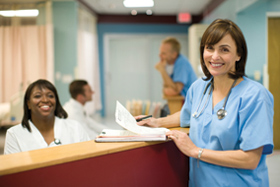 We promise to do our best to keep your child safe by:
We promise to do our best to keep your child safe by:
- Washing our hands before touching your child.
- Checking your child’s identification wristband before providing food, medication, or delivering therapy.
- Respecting your child’s privacy needs.
- Talking to you about the medications your child is taking at home, is getting in the hospital and will be sent home with.
- Talking to you about medication side effects.
- Teaching you how to care for your child in the hospital and when you get home.
- Partnering with you to maintain your child’s safety by asking that you stay
with your child when we perform physical exams or provide treatment.
Maintaining Privacy and Appropriate Relationships
• Rady Children’s staff members are trained to respect the privacy and confidentiality of our patients by not discussing medical and family issues with other patients and families. We ask that you also respect the privacy of other patients and their families. If families share information with you, please do not
discuss that information with others.
• We will only take a picture of your child with your consent and with you or a second staff member present, using authorized cameras or personal devices owned or approved by Rady Children’s, and only for identification purposes or to document care/treatment.
• You may take photos of your child in the hospital. Please respect other patients’ privacy and DO NOT take pictures of other patients.
• We will never share information about your child on social media without your consent, so while we’d love for you to “like” the official Rady Children’s Facebook page and follow us on Twitter, we hope you understand that our policies prevent employees from friending you on Facebook or following you
through other social media networks.
Caregiver/Visitor Responsibilities
• To be considerate of other patients, visitors and staff of RCHSD.
• To avoid using cell phones in areas where they are prohibited.
• To refrain from using cell phone photography, video/audio recording of staff or other patients/families.
• To refrain from bringing the following items onto RCHSD property: alcohol, illicit drugs, weapons (including knives) and pets.
• RCHSD is a non-smoking facility, smoking is strictly forbidden on campus.
• To follow RCHSD policies for infection prevention and control, including hand hygiene and following isolation procedures.
• To not enter restricted areas without permission or escort from RCHSD staff.
• To follow policies for visiting hours and to limit the number of visitors, especially in semi-private rooms.
• To avoid visiting if you are sick or not feeling well.
• To protect the property of patients and of the hospital. Please leave RCHSD property in the room/unit at time of discharge.
• While we recognize and deeply appreciate the fact that some patients and families wish to give our staff gifts, please understand that we cannot accept them. Your words of appreciation are gifts in themselves!
• Over the course of treatment, sometimes it can feel like a nurse or other staff member becomes a member of the family. Our staff values these bonds, but it is important that they maintain professional relationships with all families, and not participate in activities outside of the Hospital.
Infection Prevention Guidelines
For the health and safety of our patients, we follow infection prevention guidelines. There are several ways that you can help prevent the spread of infection:
- Hand washing. All visitors should wash their hands when entering and exiting your child’s room, before and after touching your child, and as needed. You can expect all health care providers to wash their hands before caring for your child. Ask your healthcare provider to wash their hands if you don’t know that it’s been done. Alcohol gel or soap and water are both effective ways to clean hands.
- Preventing the spread of respiratory infections. Many diseases are spread through sneezes and coughs. To prevent the spread of infection, cover your nose and mouth when you cough or sneeze. Use a tissue, or cough into your elbow. If you use your hands to cover your mouth, wash your hands right away. Encourage others to cover their coughs, as well.
- If you are sick, but feel you still need to be at the hospital with your child, please talk to your child’s nurse about extra precautions that you should take, including wearing a mask to prevent spreading illness.
- Standard precautions. As part of standard precautions, all healthcare providers will wear protective equipment (clean gloves, masks and gowns) when providing care and performing certain tasks. Staff members wear these items to prevent the spread of infection.
- Transmission-based precautions (contact, airborne or droplet). Additional precautions may be taken when patients have confirmed or suspected infectious illnesses. A sign will be placed on your child’s door indicating the type of precautions in place. Your nurse can provide you with additional information on the type of precautions needed during your child’s hospitalization.